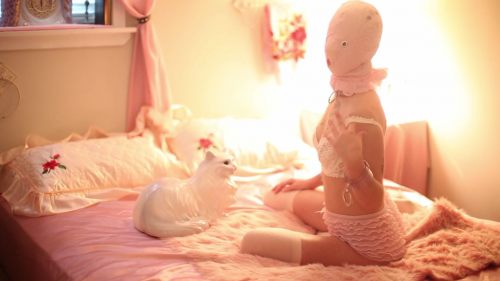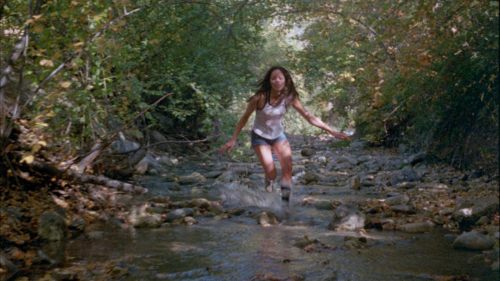When THE SEX FAMILY Went on Trial
Ordinarily, jury duty isn’t thought of as terribly stimulating; a lot of people try to pull out of it in order to avoid being subjected to endless recitations of the penal code. But back in 1977, one panel was required to watch a porno movie as part of their service—and had to go on a field trip to do it.
The film in question was All in the Sex Family, which began its tour of adult cinemas in 1973. (According to ads in other cities, it “played an UNPRECEDENTED 43 WEEKS on TIMES SQUARE!” double-billed with LOVING SEASON.) Despite the title, this is unfortunately not an X-rated spoof of the classic Norman Lear sitcom, but rather an incest opus directed (under the pseudonym Seaman Losch) and produced by Jack Bravman, who began his career with another exploration of keeping it in the family, 1968’s SEX FAMILY ROBINSON. In addition to numerous other porn credits, he also produced the Argentina-lensed thriller THE SLAUGHTER, which served as the basis of Michael Findlay’s notorious SNUFF, as well as ’80s horror flicks like ZOMBIE NIGHTMARE and VOODOO DOLLS. Findlay’s filmmaker wife Roberta notched ALL IN THE SEX FAMILY as one of her many cinematography credits. Today, the (ahem) biggest star in the SEX FAMILY cast is Jamie Gillis in one of his earlier roles, but the name featured prominently in the film’s advertising was Tina Russell, then one of the hottest names on the skinema scene, acting alongside (among other positions) her husband Jason Russell.
Tina plays Suzy, who pays a visit to her North Carolina brood, where Uncle Carl, played by Jason, has decided to make a dirty movie with his kin as the cast. (The film was also released as SEX FAMILY ROBINSON RIDES AGAIN.) Despite the Southern setting, ALL IN THE SEX FAMILY was lensed on Long Island—and therein lay the legal issues. It was the first pornographic film lensed in Suffolk County, and featured shots of recognizable local streets and landmarks. When it played in the Pine Cinema in Coram, NY, the Suffolk County District Attorney’s office got wind of it, and in April 1974, 12 people involved with the movie were arrested on obscenity and conspiracy charges. They included Bravman, Gillis and the Russells, Harold Rosen of distributor Tempo Releasing Corp., two CBS employees who had assisted the production, and Alan and Mary Comer (the latter an elementary-school teacher), Bravman’s neighbors who had helped with financing. Even the lab that had processed the film was charged in the indictment. Suffolk District Attorney Henry G. Wenzel told the New York Daily News, “We’re trying to make it evident to people who think this is a quick way to make a dollar that this is not a legitimate industry on Long Island. We’re not trying to mind other people’s morals but rather to enforce the law.”
This was far from the first time a dirty movie had been taken to court: Also in ’74, star Harry Reems and others involved with the adult-film classic DEEP THROAT were convicted of conspiracy to distribute obscene material across state lines; those convictions were later overturned. The previous year, Alfred Sole’s DEEP SLEEP (which also co-starred Gillis) went on trial—with a New Jersey prosecutor reaching back to an 18th-century anti-fornication law that was still on the books in order to bring charges. It ended with a plea bargain several days into the trial, and Sole being excommunicated from the Catholic Church, which inspired the director to next make his cult-classic, anti-Catholic horror film ALICE, SWEET ALICE.
All of the defendants in the ALL IN THE SEX FAMILY case pleaded not guilty, and were released without bail pending trial. That didn’t take place until three years later, as the Daily News reported on the first day of testimony in March 1977. By that point, the only defendants were Gillis, Tina Russell and Mary Comer; what happened to Bravman et al. is unclear. Comer was facing charges of obscenity in the first degree, a felony that could have resulted in seven years of jail time; Justice Joseph Jaspan dismissed that charge against the actors, who (like Comer) were facing third-degree conspiracy, a misdemeanor.
One of the most entertaining details of the report is that the key piece of evidence was ALL IN THE SEX FAMILY itself. And since the courtroom wasn’t large enough to facilitate a viewing of the movie, the jury traveled to a shopping-center theater in Hauppauge, NY to watch the film in its entirety. And they were instructed by Jaspan to engage in a kind of social distancing: They were prohibited from sitting beside or behind one another, to avoid “comments and titters, or remarks” during the screening. That didn’t stop Russell from sitting with her lawyer, Gerald Lotto, with the two laughing during her more explicit moments. One has to wonder whether she was chuckling when Lotto, according to the Daily News article, addressed the jury and said of Russell, “She is a confused girl, a bit immoral…a slut, maybe. For lying on her back in a movie, she was paid $100. But is she a criminal?”
For his part, Gillis said that he took part in porn because “I’m an actor. I’d rather be an actor in the medium’s lowest form than to do something else for income.” (It was reported that after shooting his SEX FAMILY scenes, he then took part in a reading of the works of playwright William Butler Yeats.) He also said, “If I am acquitted, maybe an actor won’t have to go through this again.”
There was a chance Gillis and his cohorts would have to go through that specific experience again: After 14 hours of deliberation, the jury (consisting of nine men and three women) could not settle on a verdict, and a mistrial was declared. Two weeks later, the court dismissed the charges, and the ALL IN THE SEX FAMILY case became another, lesser-known chapter in the ongoing legal saga of Adult Filmmaking v. Polite Society. As Islip Town Supervisor Peter Cohalan told the Daily News regarding the skin flick shot in his backyard, “The problem is finding a medium between community standards and not violating someone’s right to free expression.”



_500_281_81_s_c1.jpg)